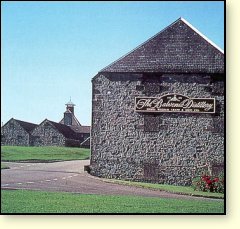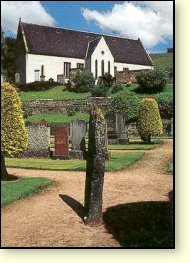
Scottish architect Robert Adam died exactly a century before the construction of Balvenie distillery, yet founder William Grant's love of the second-hand enabled Balvenie to be described today as an Adam distillery. Grant installed stills that had been sold off from other operations in his own two distilleries and he also made abandoned New Balvenie Castle, designed by the Adam brothers in the 18th century and situated on his land, the core of his new distillery.
Balvenie is the sister distillery to Glenfiddich (qv) and was built in 1892 just four years after William Grant's first venture on the Fiddich Burn. Grant had obtained inexpensive second-hand distillation equipment to build Glenfiddich and he pursued the same money-saving policy with Balvenie, getting hold of old stills from Glen Albyn and Lagavulin distilleries. Balvenie continues a floor-malting operation, now just about the last on the Scottish mainland. It supplies about 15 per cent of the distillery's malt requirements. Unlike those at Glenfiddich, the four pairs of stills are not coal-fired, but it is waste-heat from next door that creates the steam-heat to boil them. The water source is Robbie Dubh spring, as for Glenfiddich. The peat used is hand-cut locally, dried and seasoned before being used to fuel the malt-kiln.
The Whisky
Balvenie is totally different in character from Glenfiddich, despite its proximity and the fact that both use the same water and peat reek on the malt. Balvenie is big, sweet, rich and malty - almost an Earl Grey tea mix of oily fruit and astringency. Unctuous, liqueur-like, some oaky tones and sherry form the older Balvenie Classic.
Source of water
Robbie Dubh Burn
Of interest
Whisky Smugglers left a network of trails that crisscrossed the Grampian foothills. Walker Geoff Armitage has researched them and leads treks along their routes, pointing out hides in the rocks where equipment was stored and pits where barley was steeped or stored. Tel: 0340-20892. . Mortlach Churchyard was the scene of a battle in 1010 in which King Malcolm II saw off a marauding army of Danes.

A stone in Mortlach Churhyard commemorates a battle with the Danes.
|
An old Watch-House, used to guard the graves against body-snatchers, can be seen in the graveyard of the same church and the north wall with its postern door has a leper's squint. (There was a bede-house [refuge] for lepers at nearby Rathven in the 1200s.)
Balvenie Castle ruins have a double-leaf 'yett' (the Scottish version of a portcullis gate) that is the only one of its kind in the country. The special feature of a yett was the way the horizontal bars of the grille pierced the vertical bars and vice versa, making a defensive gate that was impossible to dismantle other than by melting it - a sort of architectural knitting in cast iron.
A New Distillery is now producing spirit in Speyside. The Grants added Kininvie to their Glenfiddich and Balvenie stable in 1992.
The local Golf Course has the highest hole in Britain (over 1,000 feet [305m]).
The Clock Tower has a plaque to George Stephen, co-founder of the Canadian Pacific Railway, who was born and grew up in George Street in the town.